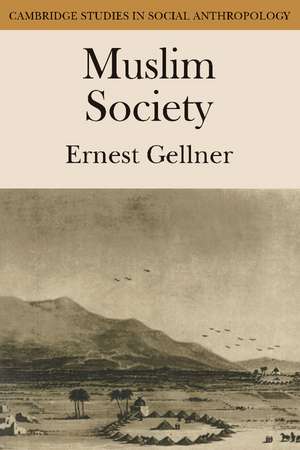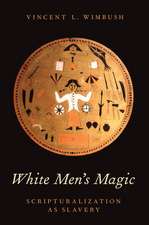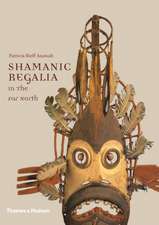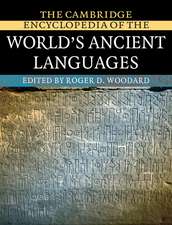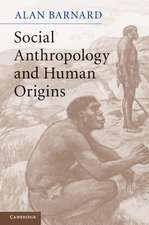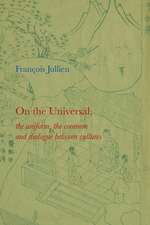Muslim Society: Cambridge Studies in Social and Cultural Anthropology, cartea 32
Autor Ernest Gellneren Limba Engleză Paperback – 2 mar 1983
Din seria Cambridge Studies in Social and Cultural Anthropology
-
 Preț: 245.24 lei
Preț: 245.24 lei -
 Preț: 195.76 lei
Preț: 195.76 lei -
 Preț: 283.25 lei
Preț: 283.25 lei -
 Preț: 284.39 lei
Preț: 284.39 lei -
 Preț: 358.13 lei
Preț: 358.13 lei -
 Preț: 282.87 lei
Preț: 282.87 lei -
 Preț: 399.21 lei
Preț: 399.21 lei -
 Preț: 397.08 lei
Preț: 397.08 lei -
 Preț: 347.28 lei
Preț: 347.28 lei -
 Preț: 295.95 lei
Preț: 295.95 lei -
 Preț: 307.62 lei
Preț: 307.62 lei -
 Preț: 280.15 lei
Preț: 280.15 lei -
 Preț: 372.80 lei
Preț: 372.80 lei -
 Preț: 411.24 lei
Preț: 411.24 lei -
 Preț: 326.27 lei
Preț: 326.27 lei -
 Preț: 281.30 lei
Preț: 281.30 lei -
 Preț: 323.81 lei
Preț: 323.81 lei -
 Preț: 278.62 lei
Preț: 278.62 lei -
 Preț: 353.63 lei
Preț: 353.63 lei -
 Preț: 174.55 lei
Preț: 174.55 lei -
 Preț: 406.71 lei
Preț: 406.71 lei -
 Preț: 326.27 lei
Preț: 326.27 lei -
 Preț: 282.26 lei
Preț: 282.26 lei -
 Preț: 436.68 lei
Preț: 436.68 lei -
 Preț: 327.22 lei
Preț: 327.22 lei -
 Preț: 414.46 lei
Preț: 414.46 lei -
 Preț: 284.78 lei
Preț: 284.78 lei -
 Preț: 289.78 lei
Preț: 289.78 lei -
 Preț: 284.17 lei
Preț: 284.17 lei -
 Preț: 283.03 lei
Preț: 283.03 lei -
 Preț: 279.00 lei
Preț: 279.00 lei -
 Preț: 398.16 lei
Preț: 398.16 lei -
 Preț: 340.24 lei
Preț: 340.24 lei -
 Preț: 277.65 lei
Preț: 277.65 lei -
 Preț: 461.13 lei
Preț: 461.13 lei -
 Preț: 390.90 lei
Preț: 390.90 lei -
 Preț: 284.78 lei
Preț: 284.78 lei -
 Preț: 347.50 lei
Preț: 347.50 lei -
 Preț: 281.49 lei
Preț: 281.49 lei -
 Preț: 278.24 lei
Preț: 278.24 lei
Preț: 177.96 lei
Nou
Puncte Express: 267
Preț estimativ în valută:
34.06€ • 35.26$ • 28.79£
34.06€ • 35.26$ • 28.79£
Carte disponibilă
Livrare economică 12-26 februarie
Livrare express 28 ianuarie-01 februarie pentru 27.10 lei
Preluare comenzi: 021 569.72.76
Specificații
ISBN-13: 9780521274074
ISBN-10: 0521274079
Pagini: 284
Dimensiuni: 152 x 229 x 16 mm
Greutate: 0.45 kg
Ediția:Reprint
Editura: Cambridge University Press
Colecția Cambridge University Press
Seria Cambridge Studies in Social and Cultural Anthropology
Locul publicării:Cambridge, United Kingdom
ISBN-10: 0521274079
Pagini: 284
Dimensiuni: 152 x 229 x 16 mm
Greutate: 0.45 kg
Ediția:Reprint
Editura: Cambridge University Press
Colecția Cambridge University Press
Seria Cambridge Studies in Social and Cultural Anthropology
Locul publicării:Cambridge, United Kingdom
Cuprins
Preface; Acknowledgements; 1. Flux and reflux in the faith of men; 2. Cohesion and identity: the Maghreb from Ibn Khaldun to Emile Durkheim; 3. Post-traditional forms in Islam: the turf and trade, and votes and peanuts; 4. Doctor and saint; 5. Sanctity, puritanism, secularisation and nationalism in North Africa: a case study; 6. The unknown Apollo of Biskra: the social base of Algerian puritanism; 7. Trousers in Tunisia; 8. The sociology of Robert Montagne (1893–1954); 9. Patterns of rural rebellion in Morocco during the early years of independence; 10. Saints and their descendants; 11. The marabouts in the market place; 12. Rulers and tribesmen; Notes; Bibliography of Ernest Gellner's North African writings; Index.
Recenzii
'The boldest and most ingenious … attempt in recent years to present a general account of the fundamental features of social life in the Islamic World.' Clifford Geertz, New York Review of Books
'Building on the Khaldunian core Professor Gellner has provided us with a series of brilliant essays whose sustained originality, compact argumentation and pervasive wit cannot be adequately described in a review of limited length.' Serif Mardin, Government and Opposition
'The vast amount of information it contains, together with the questions which it successfully raises, makes this in any case the kind of exposé that can be read with genuine intellectual pleasure. Whatever the debate it may provoke amongst specialists, it has enriched the way in which we look at the Muslim world.' Jacques Berque, The Times Literary Supplement
'His conclusions are supported by a keen observation and wide knowledge of his subject, but because they are based exclusively on the North African political scence, how applicable they are elsewhere in the Muslim world remains a question. Nevertheless, Gellner has made an important contribution to the study of Islamic culture.' Abbas Kelidar, SOAS Bulletin
'Brilliant work … Professor Gellner has continued a work to this field that all scholars of Islam, and especially those who uphold the faith, must read with care.' M. A. Zaki Badawi, Arabia
'The revival of Islam … proves to be an apparently insuperable obstacle to modernization, Western-style. From Morocco to Indonesia there are signs of unrest, of the desire for 'purification', with Iran merely the most spectacular illustration. Professor Ernest Gellner is almost uniquely qualified to discuss the implications of this development.' Ralf Dahrendorf, Millenium: Journal of International Studies
' … the first essay … which is much the longest in the book … I consider … to be of outstanding importance. It should be compulsory reading for all novice readers of social anthropology.' Sir Edmund Leach, New Society
'Building on the Khaldunian core Professor Gellner has provided us with a series of brilliant essays whose sustained originality, compact argumentation and pervasive wit cannot be adequately described in a review of limited length.' Serif Mardin, Government and Opposition
'The vast amount of information it contains, together with the questions which it successfully raises, makes this in any case the kind of exposé that can be read with genuine intellectual pleasure. Whatever the debate it may provoke amongst specialists, it has enriched the way in which we look at the Muslim world.' Jacques Berque, The Times Literary Supplement
'His conclusions are supported by a keen observation and wide knowledge of his subject, but because they are based exclusively on the North African political scence, how applicable they are elsewhere in the Muslim world remains a question. Nevertheless, Gellner has made an important contribution to the study of Islamic culture.' Abbas Kelidar, SOAS Bulletin
'Brilliant work … Professor Gellner has continued a work to this field that all scholars of Islam, and especially those who uphold the faith, must read with care.' M. A. Zaki Badawi, Arabia
'The revival of Islam … proves to be an apparently insuperable obstacle to modernization, Western-style. From Morocco to Indonesia there are signs of unrest, of the desire for 'purification', with Iran merely the most spectacular illustration. Professor Ernest Gellner is almost uniquely qualified to discuss the implications of this development.' Ralf Dahrendorf, Millenium: Journal of International Studies
' … the first essay … which is much the longest in the book … I consider … to be of outstanding importance. It should be compulsory reading for all novice readers of social anthropology.' Sir Edmund Leach, New Society
